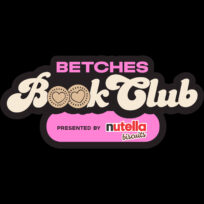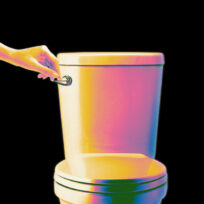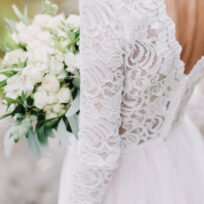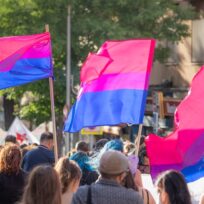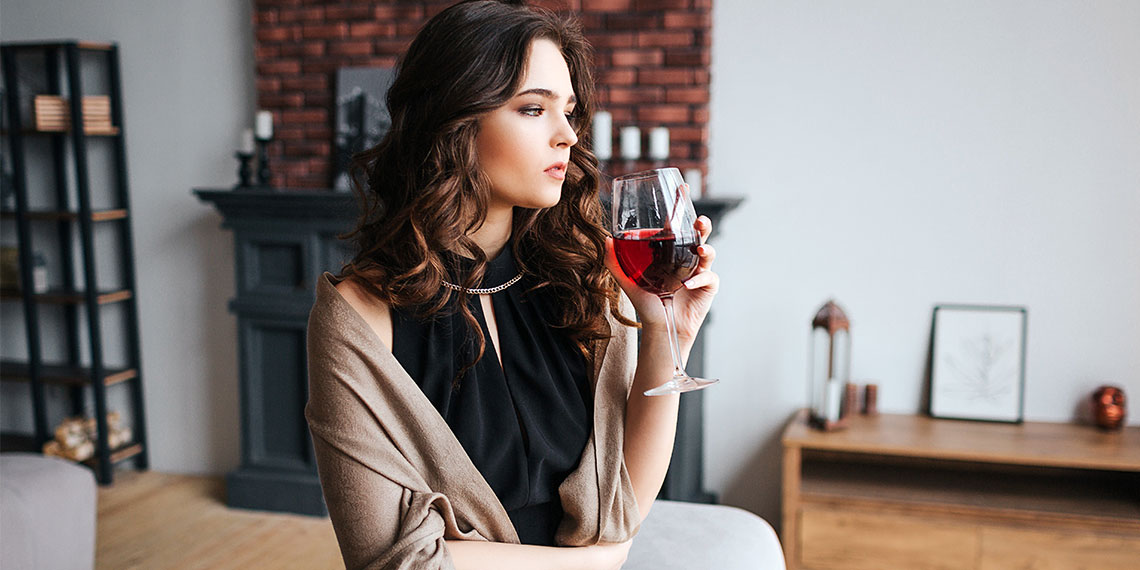Leap Day is the last day of the Before Times I remember vividly. I drove to the mall to pick up something at Sephora. A huge crowd of families had gathered for an athletic demonstration by former American Ninja Warrior contestants. In Nordstrom, I inhaled a lemon and mint-scented candle that was supposed to remind me of the Amalfi coast. I browsed leather wallets, touching the oversized zippers and snapping the coin pockets closed.
On the way home, I thought, for the thousandth time, I should really cut back on drinking. I thought this even as I pulled into the liquor store parking lot and went inside to buy a bottle of white, a bottle of red, and a bottle of peppermint Schnapps (novelty!).
I drank two glasses of white wine on Saturday night and called my fiancé, who was working a convention in Chicago.
“Is attendance down?” I asked. I’d been following news of a virus in suburban Seattle.
“It’s actually the highest attendance we’ve ever had,” he said.
This seemed vaguely disturbing, so I made hot chocolate with a shot of Schnapps.
I should really cut back, I thought again. My drinking always seemed like a problem for Future Me to solve. Just thinking about dealing with it was stressful enough to justify a little treat for Present Me.
Be Here Now.
Be Here Now with Your Wine.
I have never been a binge drinker. I don’t get hangovers. I won’t regale you with wild drunken tales because I don’t have any. My habit is two glasses of wine a night. I have tried to be a one-glass-of-wine-with-dinner person, but I like to have a glass while I cook, and then one becomes a setup for the punchline of two. Occasionally, two is enough to shut up my inner disciplinarian and I can say what the hell, and have a third, which puts me right to sleep, and then I get to enjoy being awake from 2 to 4am, scrolling Twitter and hating myself, swearing this will never happen again, this time I will learn. You might call this “a pattern.” Or the definition of stupidity: doing the same thing over and over, expecting different results.
During this period I read dozens of addiction memoirs. I underlined sentences that made me feel seen, but also superior: I wasn’t that bad. I wasn’t drinking my breakfast; I wasn’t drinking secretly; I wasn’t blacking out. I read stories of other writers’ rock bottoms to prove to myself I didn’t have a problem, or at least no problem I couldn’t solve by harnessing more discipline and willpower. I resisted sobriety in the same way I politely declined pamphlets from Jehovah’s Witnesses in the subway. The believers had their religion—I had mine.
I believed I had two choices: go to AA (which I’d read a lot about in my alcoholism memoirs) or keep drinking to cover up the stress of wishing I could drink less. I was afraid of getting sober. I know sober people—they are fun and fascinating and creative, my beloved friends. They are also sober for life. It was the level of commitment that freaked me out. I was also freaked out by the idea of admitting I was powerless over alcohol and that my life had become unmanageable. I don’t like to admit I’m powerless over anything. And my life was just fine, thank you (except for the, uh, secret shame that showed up at 4am).
Then I heard about Annie Grace, a writer offering a 30-day “alcohol-free challenge to interrupt your habits and help you take control.” When I read this, it was like an arrow aimed straight at my anxiety and my excuses: just 30 days, I could do that! A “challenge”? As an overachiever, I love challenges! My habits definitely needed an interruption. I would try any program that offered a path to regain control.
On Sunday, March 1st, I finished the bottle of white. On Monday, I began my 30 days.
Grace’s method is based around resolving the conflict between our unconscious beliefs (such as alcohol relieves stress) and our desires (I want to drink less). When I started following her exercises, I realized that drinking actually added more stress to my life, because I was constantly calculating how much I would have, setting rules around my drinking, and then beating myself up when my willpower failed.
“If alcohol truly relaxed us,” Grace writes, “wouldn’t we need less of it over time?”
As soon as I stopped drinking wine, I started sleeping better. When I got enough sleep, I noticed I didn’t crave so much carbs and cheese (my two favorite food groups). My mood improved; I wasn’t compulsively replaying things I’d said or written in an email, berating myself for stupid questions or awkward comments. I could stay up later to watch movies with my partner because I was no longer nodding off on the couch from the alcohol.
Day 11 is when the miracle happened: I wrote a poem for the first time in nearly a decade. Reading and writing poetry had been my creative outlet since I was a teenager, but somewhere in my twenties I lost it. I thought I had just grown out of that phase, or maybe my life had stabilized so much (no more dating drama) that I no longer had any material for poems. The gift of poetry on my 11th day of sobriety felt like a chandelier turned on in a haunted ballroom in my brain that no one had danced in in years.
A week later, the governor of my state, Connecticut, issued a stay at home order. By April, the entirety of my social life was unfolding on Twitter. My alcohol-free experiment coincided with drinking becoming one of the few fun things you could do inside your own home.
“Remember how everyone was gonna stop drinking?” one woman tweeted. Ha ha! “It seems wine o’clock might need to be moved to 9am,” another said. The “quarantini” was born and a grandma in New Jersey went viral on TikTok for giving it a shake shake shake! On my daily walk around the cul de sac, I listened to a podcast that recommended I relax by watching a video of Ina Garten make a pitcher of Cosmos and then pour it into a single-serve martini glass the size of her head. If I’ve been saving a bottle of wine or champagne for a special occasion, the hosts suggested I drink it now—why wait?
Time for a quarantiniii🍸😷
@AviationGin @vancityreynolds pic.twitter.com/l11ZWavFfg— marilyn starkloff (@MStarkloff) March 12, 2020
By this point, I had become very sensitive to the kind of messages our culture sends about alcohol, especially to women: you’ve had a long day, you deserve it! It’s not drinking alone if the kids are home! Wine is good for you!
I’d spent the past three years researching and writing my novel Self Care, which satirizes the wellness industry. I see “wellness” as diet culture re-branded. Among my millennial feminist peers, it’s taboo to talk about dieting: how much weight you want to lose, how much weight you have lost, how many calories are in a cup of grapes. Every body is a bikini body—just put a bikini on it! But there is no taboo against talking about drinking, or joking about overdoing it. If your tolerance is so high you can keep up with the boys, yasssss queen!
How could I judge people for drinking more during the pandemic? Let’s be real: if I hadn’t committed to my experiment before the stay at home order, I likely would have graduated from white wine to bourbon cocktails.
Oh, did I mention that the main character of Self Care has a drinking problem? (My book editor didn’t think her drinking problem was obvious enough—it was based on my own drinking—so I ramped it up in my next draft.)
I made it to Day 30 and decided to try for another 30 and then another. Ultimately, I went 104 days without drinking alcohol. I wrote 34 poems.
Ironically, I started drinking wine again for the same reason I had avoided abstaining in the first place: because I felt pressured to commit for life. I didn’t want “sober” to become my identity. After 104 days, I felt proud of myself for committing to the experiment and for closely examining, and shifting, my relationship with alcohol. If you had asked me on January 1st if I could go 100 days without drinking a glass of wine, I would have told you the odds were about as likely as me swimming across the English Channel.
After a few weeks of falling back on old habits during the busy time of my novel launch, I am now in a place where I have wine on weekends, and pineapple kombucha on school nights.
I know many women who are committed to a life without alcohol, and on Instagram I cheer on their sobriety milestones. On Instagram, you’ll also find a lot of brands (and influencers) selling programs and products to cleanse, detoxify, and purify your diet/skin/workout/scalp/gut/sleep/life. Underlying all this marketing is the uncomfortable truth that many of us feel bad on a daily basis. We feel toxic. Our bodies and brains are overwhelmed by the stress of the pandemic, financial precarity, racial injustice, political inaction, frustrations over schooling this fall, and uncertainty about the future.
I’m not here to tell you what you should or shouldn’t drink right now to manage your stress. I don’t have a program to sell you or a fancy elixir with adaptogens (though I do believe any beverage can be elevated by adding maraschino cherries). I’ve lived online long enough to become jaded and cynical about influencer culture and the rarefied echelons of the wellness industry that sell expensive lifestyle upgrades to the class of Americans that is privileged enough to afford the basics.
I decided to run an experiment to better understand my dependence on alcohol only after I reached the limit of cognitive dissonance I could tolerate. I was tired of thinking one thing and doing another. I was tired of feeling out of control and like I was failing my best intentions. Only you know what cobwebs decorate the dark, echoing ballroom of your mind. No influencer can tell you why you’ve been avoiding that lonely room. Only you can hear the song your body plays when it’s trying to tell you what it needs.
Images: Estrada Anton / Shutterstock.com; leighstein / Instagram; @MStarkloff / Twitter

